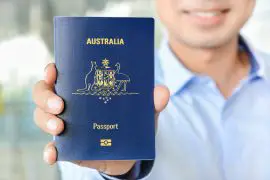Obtaining a Permanent Residency (PR) in Australia has long been a coveted goal for skilled migrants worldwide. With its high standard of living, diverse opportunities, and strong economy, Australia continues to attract individuals seeking to make it their home. The Australian government operates a points-based immigration system to assess skilled visa applications, considering factors such as age, language proficiency, work experience, qualifications, and adaptability. One crucial aspect influencing the PR application process is the state or territory nomination programs.
This article delves into the question many aspiring migrants ponder: “Which state is the easiest to get PR in Australia?”
Contents
Understanding the Australian Skilled Migration System
Australia’s skilled migration system is renowned for its fairness and effectiveness in attracting skilled workers worldwide. Employed by the Australian government, the points-based immigration system forms the basis for assessing skilled visa applications. This system evaluates applicants on various criteria, and the accumulated points determine their eligibility for Permanent Residency (PR).

1. Points-Based Immigration System:
The points-based system assigns a specific value to each criterion, and applicants must meet a minimum points threshold to be eligible for PR. The higher the points obtained, the greater the chances of receiving an invitation to apply for a visa.
2. Key Factors Considered:
Several essential factors contribute to the points allocation. These factors include age, English language proficiency, work experience, educational qualifications, and adaptability to the Australian way of life.
– Age: Applicants between certain age brackets are awarded points, with younger applicants receiving more points.
– English Language Proficiency: English language competence is highly valued, and applicants must demonstrate their language skills through recognized language tests like IELTS or TOEFL.
– Work Experience: Prior work experience in a nominated occupation can significantly enhance applicants’ chances of obtaining PR. More experience often leads to more points.
– Educational Qualifications: Points are allocated based on the applicant’s educational attainment.
– Adaptability: Additional points can be gained for factors like studying in Australia, having relatives in the country, or showing previous experience in the Australian labor market.
3. Importance of Relevant Occupation:
A relevant occupation listed on either the Skilled Occupation List (SOL) or the Regional Occupation List (ROL) is critical for state nomination. Each state or territory has specific skill needs and may nominate applicants with demanding occupations within their region. This nomination can give applicants additional points and priority processing, boosting their chances of securing PR.
State Nomination Programs
State and territory nomination programs are vital in obtaining a Permanent Residency (PR) in Australia. These programs offer an avenue for skilled migrants to be nominated by a specific state or territory, which can significantly enhance their chances of receiving an invitation to apply for a visa and ultimately securing PR.
1. Role of State and Territory Nomination Programs:
State and territory governments actively participate in Australia’s skilled migration system by identifying and nominating skilled migrants with the qualifications and skills to address labor market gaps and regional demands. By nominating applicants, states and territories contribute to their regions’ overall economic growth and development.
2. Different Criteria and Requirements:
Each state and territory has its criteria and requirements for nominating skilled migrants. These criteria are designed to address the specific skill shortages and regional needs unique to each area. Consequently, applicants interested in state nomination must thoroughly research and understand the specific guidelines set by the state or territory they wish to be nominated.
– Occupation Demand: States and territories often prioritize occupations in high demand within their region. Applicants with skills that align with these demands are more likely to receive a nomination.
– Work Experience: Some regions may require a minimum of years of work experience in the nominated occupation as part of their criteria.
– Regional Ties: Certain state nomination programs may offer preferences to applicants who have studied, worked, or have family connections within the region.
3. Benefits of State Nomination:
State nomination provides several advantages for skilled migrants seeking PR in Australia:
– Additional Points: One of the most significant benefits is allocating additional points in the points-based immigration system. These extra points can significantly boost an applicant’s overall score, enhancing their competitiveness for an invitation to apply for a visa.
– Priority Processing: State-nominated applicants often receive priority processing for their visa application. This means their applications are given higher priority in the queue, reducing waiting times and expediting the PR process.
– Occupation Availability: State nomination can open up opportunities for applicants whose occupations may not be on the National Skilled Occupation List (SOL) but are in demand in a particular state or territory.
Factors Influencing PR in Different States
Obtaining a Permanent Residency (PR) in Australia can vary depending on the state or territory where skilled migrants apply. Several factors come into play, influencing the ease of obtaining PR in certain states compared to others.
1. Demand for Specific Skills and Occupations:
Different states and territories in Australia have distinct economic priorities and skill shortages. As a result, some regions may experience a higher demand for specific skills and occupations than others. Skilled migrants with qualifications and work experience in these in-demand fields have a greater chance of receiving state nomination and subsequent PR approval.
2. State Nomination Programs:
States and territories with more streamlined and favorable nomination programs tend to attract more skilled migrants. Regions seeking to address their skill shortages through efficient and accessible nomination processes become more attractive to applicants pursuing PR in Australia.
3. Regional Development Initiatives:
States and territories actively focused on regional development may prioritize skilled migrants who commit to living and working in regional or remote areas. Such regions often have occupation lists tailored to their unique needs, offering additional incentives and opportunities for applicants willing to settle in these locations.
4. Population Distribution Policies:
Some states may have specific population distribution policies encouraging skilled migrants to settle in less densely populated areas. Incentives such as additional points, faster processing times, and improved lifestyle offerings might be available to migrants willing to contribute to the growth of these areas.
5. Visa Quotas and Allocations:
The number of skilled migration visas allocated to each state or territory can also influence the ease of obtaining PR in a particular region. States with higher visa quotas or relatively lower demand from skilled migrants may have a more straightforward pathway to nomination and PR.
Examples of States with Higher Accessibility for Skilled Migrants:
In recent years, certain states and territories in Australia have been known for their accessibility to skilled migrants seeking PR:
1. South Australia: South Australia’s state nomination program, known as the “Skilled Nominated Visa (Subclass 190) – State Nominated,” has proactively attracted skilled migrants. The state’s occupation list often includes a diverse range of in-demand professions, making it appealing to applicants with relevant skills.
2. Tasmania: Tasmania has proactively addressed its regional skill shortages. The state’s nomination program, particularly the “Tasmanian Skilled Occupations List (TSOL),” has provided ample opportunities for skilled migrants in various industries.
3. Victoria: Victoria’s state nomination program has been popular among skilled migrants due to its comprehensive occupation list and robust regional development initiatives. The state’s commitment to attracting skilled workers has made it a favorable destination for PR applicants.
Case Studies and Success Stories
Real-life case studies of individuals who have achieved Permanent Residency (PR) in Australia through state nomination programs are inspiring examples for other aspiring skilled migrants. These success stories shed light on the factors contributing to their favorable outcomes and their diverse pathways to secure PR in different states.
1. Case Study 1: Sarah – South Australia Nomination
Sarah, an experienced IT professional from India, dreamt of settling in Australia. After thorough research, she identified South Australia as a potential destination due to its strong demand for IT specialists. Sarah’s key factors for success were:
– Relevant Occupation: Sarah’s occupation as a Software Engineer was in high demand on South Australia’s occupation list, significantly boosting her chances of receiving a nomination.
– State Sponsorship: Sarah applied for state nomination through the “Skilled Nominated Visa (Subclass 190) – State Nominated.” South Australia’s efficient and straightforward nomination process facilitated her application.
– Regional Commitment: Sarah expressed her willingness to live and work in South Australia for a specified period, aligning with the state’s regional development initiatives.
2. Case Study 2: Michael – Tasmania Nomination
Michael, a skilled chef from the Philippines, aspired to immigrate to Australia with his family. He discovered that Tasmania had a shortage of qualified chefs and was eager to explore the state’s nomination program. Michael’s successful journey was influenced by the following:
– State Demand: Tasmania’s “Tasmanian Skilled Occupations List (TSOL)” featured the occupation of chef, which had been experiencing a shortage. His expertise was highly sought-after in the state.
– Family Commitment: Michael emphasized his family’s willingness to embrace Tasmania’s lifestyle and actively contribute to the community, making his application more compelling.
– Job Offer: Michael secured a job offer from a renowned restaurant in Tasmania, showcasing his readiness to contribute to the local hospitality industry.
3. Case Study 3: Alex – Victoria Nomination
Alex, a civil engineer from Brazil, aimed to pursue PR in Australia and explored various nomination options. His ultimate success in securing PR through Victoria’s state nomination program was influenced by the following:
– Regional Focus: Victoria’s “Visa Nomination Occupation List for Victoria” highlighted the demand for civil engineers, particularly in regional areas. Alex expressed his interest in contributing to regional development.
– Professional Network: Alex established professional connections in Victoria during his study abroad program, strengthening his ties to the state and demonstrating his adaptability.
– State Nomination Pathway: Alex opted for Victoria’s “Skilled Nominated Visa (Subclass 190) – State Nomination” and was nominated based on his qualifications and dedication to contributing to Victoria’s infrastructure growth.
Tips for Aspiring Permanent Residents
For individuals aspiring to obtain Permanent Residency (PR) in Australia, a strategic and well-informed approach can significantly increase their chances of success. Here are some practical tips and advice to maximize their opportunities:
1. Thorough Research on State Nomination Programs:
Before deciding on a specific state or territory for PR, conduct thorough research on the nomination programs offered by each region. Understand the specific skill demands, occupation lists, and eligibility criteria for state nomination. Identifying states with high demand for your profession can increase your likelihood of receiving the nomination.
2. Align Skills with Occupation Demand:
Choose an occupation that aligns with the skill shortages in Australia. Skilled migrants with qualifications and work experience in high-demand fields have a greater chance of securing PR through state nomination programs. Keeping track of changes in occupation lists and demand trends is crucial for successful application planning.
3. Meet English Language Requirements:
A strong command of the English language is vital for skilled migrants seeking PR in Australia. Ensure you meet the English language proficiency requirements by taking recognized language tests like IELTS or TOEFL. Higher language proficiency can earn you valuable points in the points-based system.
4. Gain Relevant Work Experience:
Having relevant work experience in your nominated occupation can significantly boost your chances of success. Gain relevant experience in your home country or consider gaining work experience in Australia through temporary work visas like Subclass 482 or Subclass 485.
5. Obtain a Skills Assessment:
A skills assessment by a relevant Australian assessing authority is usually mandatory for most skilled migration visas. Follow the assessment process diligently and provide accurate documentation to prove your qualifications and skills.
6. Submit a Strong Application:
Prepare a comprehensive and well-structured application highlighting your qualifications, work experience, language proficiency, and other factors that can earn you extra points. A strong application increases your chances of being invited to apply for a visa.
7. Seek Professional Advice:
Navigating the complex immigration process can be challenging. Consider seeking guidance from registered migration agents or immigration lawyers. They can provide expert advice, assess your eligibility, and help you make informed decisions throughout the application process.
8. Plan for Regional Commitment:
States with regional development initiatives may offer additional incentives for skilled migrants willing to live and work in regional areas. If possible, express your commitment to settling in regional or remote parts of Australia, as this can enhance your prospects for state nomination.
9. Be Patient and Persistent:
Obtaining PR in Australia can be a time-consuming process. Be patient and persistent in your pursuit. Regularly check for updates on occupation lists, eligibility criteria, and immigration policies, and adapt your strategy accordingly.
Which state is the easiest to get PR in Australia?
In conclusion, obtaining Permanent Residency (PR) in Australia through state nomination programs involves Careful planning, Understanding the points-based immigration system, and Aligning skills with occupation demand.
Key points discussed in this article include The significance of state nomination programs., The role of various factors in influencing PR opportunities in different states.,The success stories of skilled migrants who navigated the immigration process successfully.
While certain states may offer higher opportunities for PR due to their specific skill demands and efficient nomination processes, it is essential to remember that each individual’s journey is unique. Meeting eligibility criteria, having relevant work experience, demonstrating English language proficiency, and preparing a strong application are crucial factors that can impact the success of a PR application, regardless of the state chosen.
As immigration policies and state nomination program criteria can change over time, aspiring permanent residents are encouraged to stay updated with the latest developments. Regularly checking for updates on occupation lists, eligibility requirements, and policy changes will ensure applicants are well-informed and can adjust their strategies accordingly.





